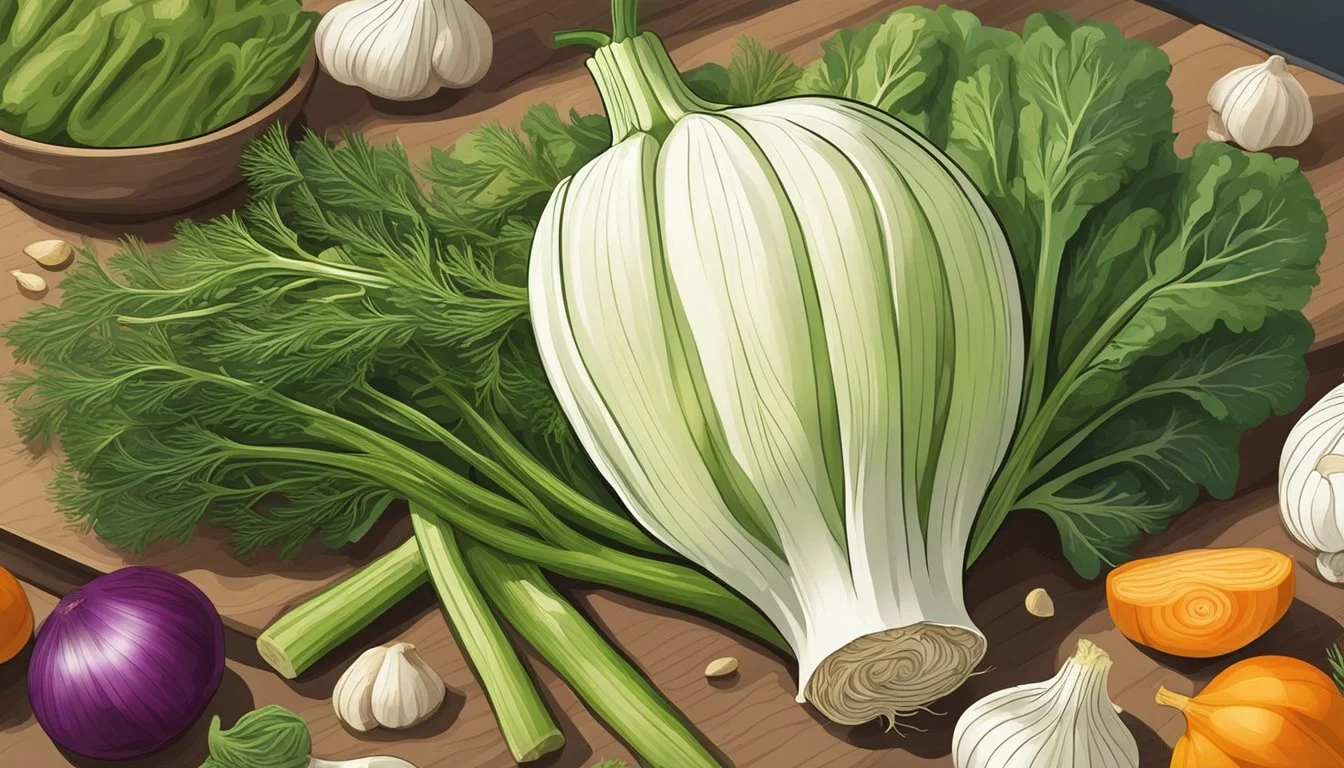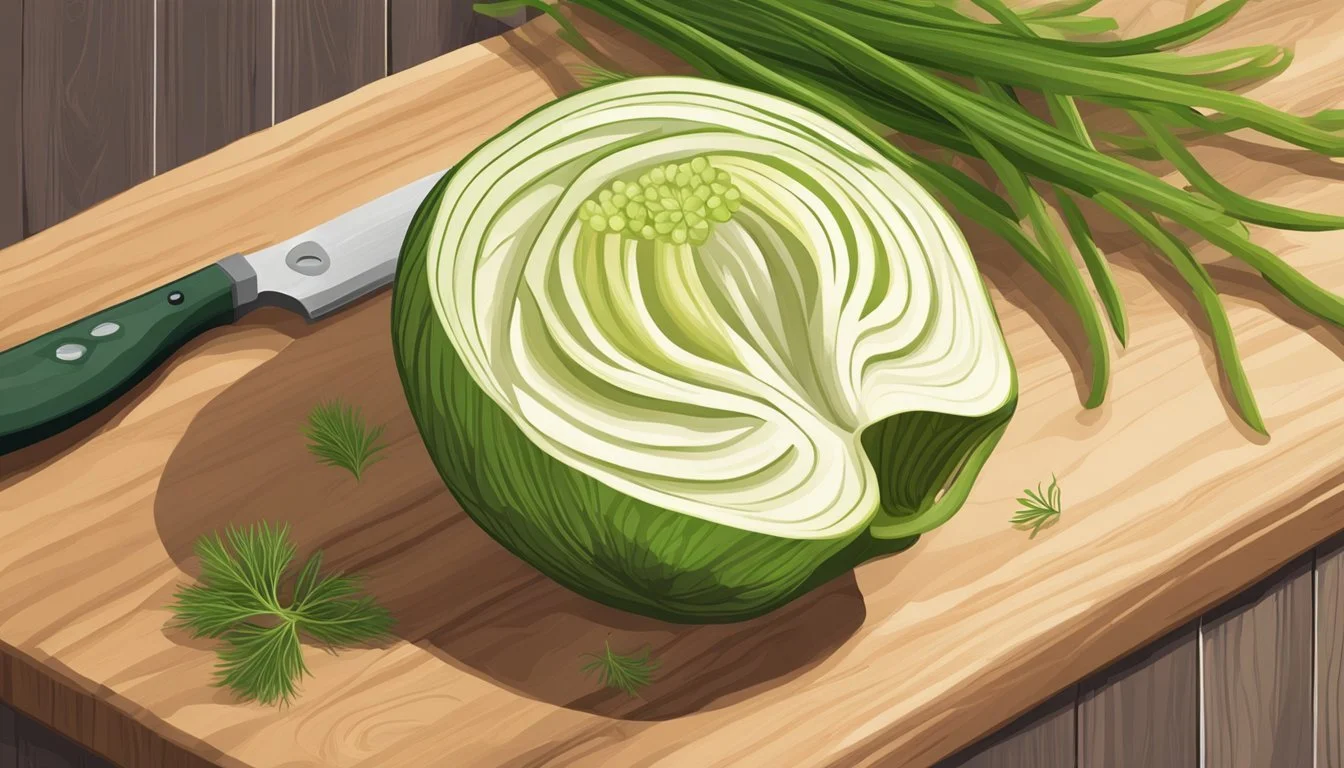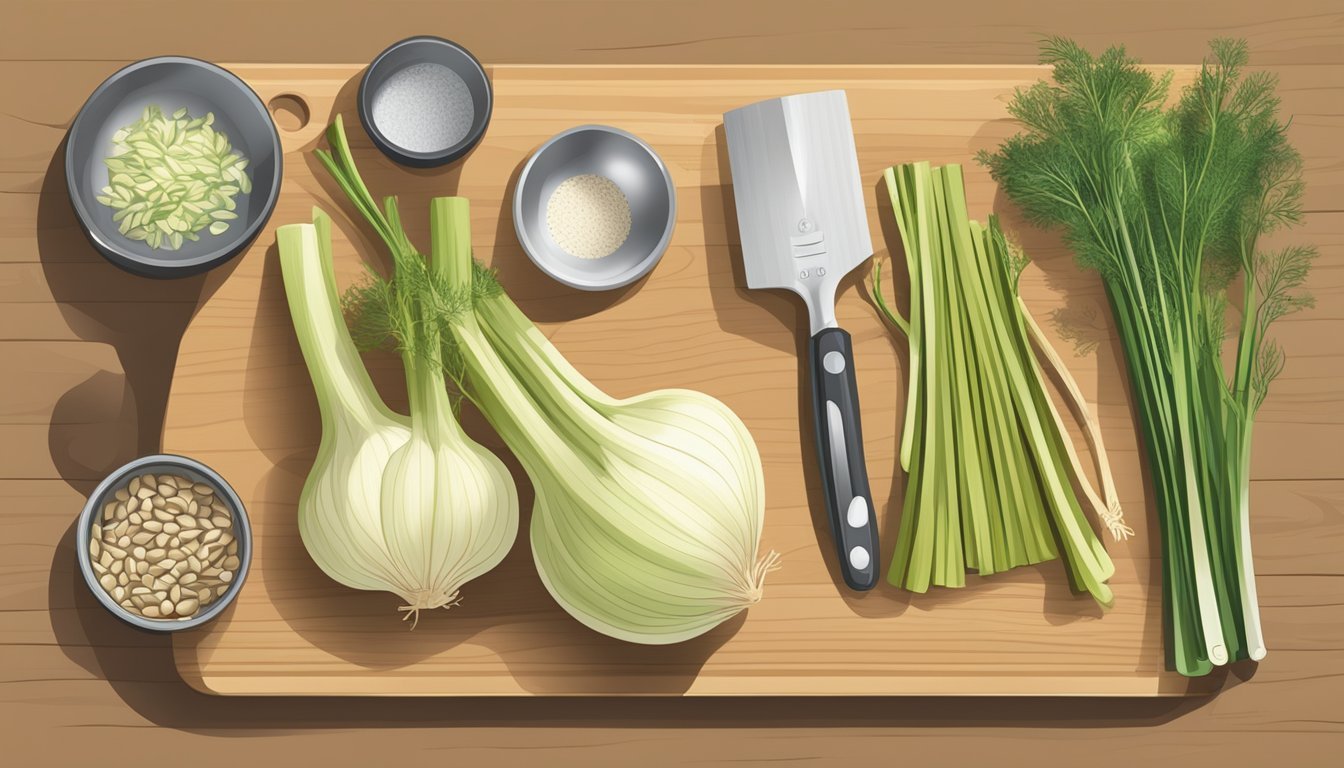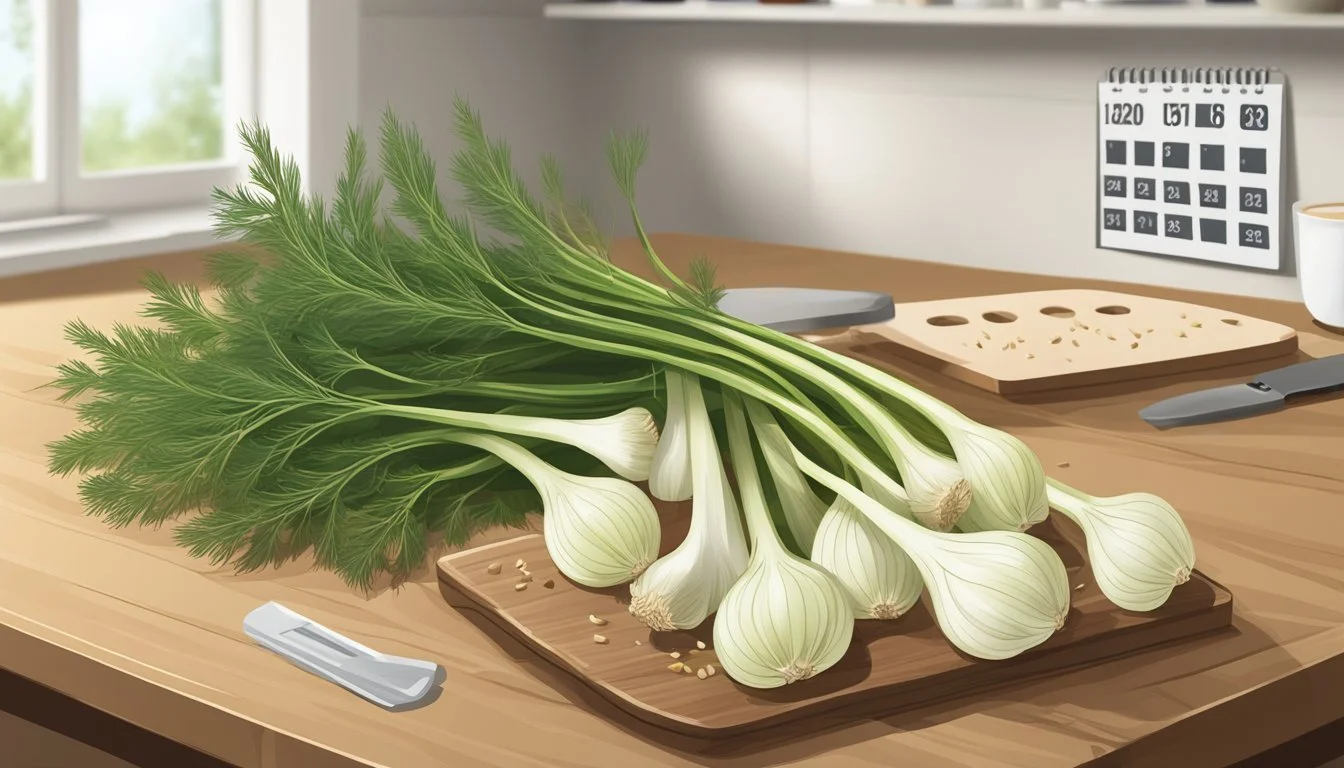How Long Does Fennel Last?
Shelf Life and Storage Tips
Fennel (how long does fennel last?), a flavorful and aromatic vegetable, has a relatively short shelf life when compared to other produce. Typically, fresh fennel will last about one to two weeks if stored properly in the refrigerator. Its longevity depends on maintaining a dry and cool environment, which helps preserve its crisp texture and distinctive licorice-like flavor. Fennel consists mainly of water, making appropriate storage crucial to prevent it from becoming limp or moldy.
To extend the shelf life of fennel, one should start by separating the stalks and fronds from the bulb, as these parts can be stored differently. The bulb should be wrapped in paper towels to absorb any excess moisture and placed in a plastic bag before storing it in the refrigerator. The stalks and fronds may be kept in open plastic bags or wrapped in damp paper towels to maintain their freshness.
For those who need to preserve fennel for longer periods, freezing is an option. When properly stored in the freezer, fennel can maintain its best quality for about 12 months. To freeze fennel, it's recommended to blanch it first to preserve its texture and flavor. Once frozen at 0°F, it remains safe indefinitely, although its quality may diminish over time.
Fennel Fundamentals
In the culinary world, fennel is recognized for its distinctive anise-like flavor and its versatility in dishes ranging from salads to stews. This section provides key insights into its profile, selection tips, and nutritional value.
Fennel Profile
Fennel is a flowering plant species in the carrot family, known for its bulb, stalk, and feathery leaves. The bulb is the most widely consumed part, characterized by its crisp texture and a mild, sweet licorice flavor similar to anise. Fennel seeds, derived from the plant's flowers, are used as a spice, while the stalk and leaves can add an herbaceous quality to dishes.
Selection and Buying Tips
When buying fennel, look for firm, white bulbs with no signs of splitting, browning, or bruising. The stalks should be relatively straight, green, and have feathery, bright green fronds. A strong, fresh smell is indicative of quality and freshness. Fresh fennel should be heavy for its size, indicating it's not dried out.
Nutritional Information
Nutritionally, fennel is high in vitamin C, potassium, and other essential vitamins and minerals, such as calcium. It is a healthful addition to any diet, contributing to a range of benefits due to its nutrient richness.
Nutrient Importance Vitamin C Supports immune system, skin health, and iron absorption Potassium Aids muscle function, regulates fluid balance Calcium Essential for bone health and proper function of heart, muscles, and nerves
By bringing together these aspects of fennel, consumers can make informed decisions when selecting and enjoying this aromatic vegetable in their cooking.
Storing Fennel
Proper storage of fennel is crucial for maintaining its freshness and extending its shelf life. Whether it is meant for short-term use or long-term preservation, knowing the right methods to store fennel can prevent spoilage and waste.
Short-Term Storage
For short-term storage, fennel bulbs should be kept in the refrigerator. It is advisable to wrap them in a damp paper towel or a kitchen towel, and then place them inside a plastic bag. This method helps to keep them fresh for approximately 7 to 10 days. Storing the fennel in the crisper drawer of the fridge can provide a cooler and more regulated environment.
Do:
Refrigerate fennel bulbs wrapped in a damp paper towel.
Place them in a plastic bag to retain moisture.
Don't:
Wash fennel before refrigerating as this can introduce excess moisture leading to mold.
Long-Term Storage
When it comes to long-term storage, fennel can be frozen to extend its shelf life up to 10 to 12 months. Prior to freezing, one should blanch the fennel to preserve its texture, flavor, and nutritional content. After cooling, dry the blanched fennel and pack it in freezer bags, removing as much air as possible before sealing.
Steps for Freezing Fennel:
Blanch fennel bulbs for a few minutes in boiling water.
Cool immediately in ice water.
Dry thoroughly to remove excess moisture.
Place in freezer bags, expel air, and seal.
Preventing Spoilage
To prevent spoilage, store fennel in the correct conditions. Avoiding exposure to excess moisture and mold is essential. Separating the stalks and fronds from the bulbs and storing them individually can also help keep them dry and fresh longer. Fennel should be stored in a cool, dark place, ideally within the refrigerator for short-term and in the freezer for long-term.
Key factors in preventing fennel spoilage:
Dry: Ensure fennel is dry before storage.
Cool: Store at a cool temperature, be it in the fridge or freezer.
Separate: Keep fronds and stalks separate from the bulbs to maintain quality.
Using Fennel in Cooking
Fennel is a multifaceted herb that imparts a unique anise-like flavor to a variety of dishes, and can be used both fresh and cooked, with each part of the plant offering different culinary possibilities.
Fennel in Recipes
Fennel features prominently in Mediterranean cuisine, where its distinct, slightly sweet, and licorice-like flavor accentuates salads, soups, and fish dishes. The bulb is crunchy when raw making it perfect for salads, while cooked fennel takes on a more mellow and tender profile suitable for meat accompaniments. The seeds are commonly used as spices, and alongside fennel's relative dill (how long does dill last?), both can be used as flavorful herbs in various recipes.
Raw: Adds a crisp, refreshing note to salads.
Cooked: Complements rich fish and meat dishes.
Preparation Techniques
Before using fennel, one should wash the bulb, stalks, and fronds thoroughly to remove any dirt. The bulb can be chopped into slices or diced, depending on the recipe requirement.
Boiling can soften the bulb for purees or soups, while freezing is an option for long-term storage, although it might slightly alter the texture.
Freezing: To freeze fennel, first blanch the slices in boiling water, then submerge in ice water, drain well and place in airtight containers before freezing.
Recognizing Spoiled Fennel
Recognizing when fennel has gone bad is crucial to ensure food safety and to avoid consuming produce that could be detrimental to health. This section will elaborate on the various indicators of fennel spoilage and expected shelf life under proper storage conditions.
Signs of Deterioration
When inspecting fennel bulbs for freshness, one should look for these tell-tale signs:
Appearance: Fresh fennel bulbs are crisp and have a clean, pale green or white color. If the bulbs have visible brown spots, discoloration or look shriveled, they may be starting to spoil.
Texture: A bulb should be firm to the touch. A soft texture or the presence of slimy spots indicates that the fennel is past its prime.
Smell: Fennel typically has a fresh, lightly anise-like aroma. An off or unpleasant odor is a clear sign that the fennel should not be consumed.
Shelf Life Expectations
The expected shelf life of fennel can vary significantly based on how it is stored:
Refrigeration: Within the fridge, fennel bulbs can typically last up to 10 days. They should be wrapped in a damp paper towel and placed in a plastic bag to maintain moisture.
Expiration Date: While fennel does not usually come with an expiration date, the above guidelines can help determine how long it can be kept refrigerated before use.
Frozen Fennel: When stored in the freezer at 0°F, fennel can maintain good quality for about 12 months, although it will remain safe beyond that time if kept frozen constantly.
Always observe the storage environment; fennel should be kept in a cool, dark place when not stored in the fridge to prolong its shelf life.
Alternative Uses for Fennel
In addition to its culinary popularity, fennel is renowned for its versatility, which extends to non-culinary applications where its parts, from stalks to fronds, are utilized.
Non-Culinary Applications
Stalks and Fronds: They possess an enticing aroma that not only flavors dishes but can also be used for their scent. In the context of home fragrance, they can be included in potpourri.
Digestion and Health: Consumed in herb form, fennel is traditionally considered beneficial for digestion. People have used it in teas and natural remedies to promote gut health.
Versatile Vegetable: Even in non-edible forms, fennel contributes to household sustainability. Its stalks can be fashioned into various crafts or used as natural aromatic compost additions, leveraging the plant's full potential.
Conclusion
The shelf life of fennel is influenced significantly by storage methods. When stored correctly in the refrigerator, fennel bulbs may last up to one week. To extend their freshness, one should wrap the bulbs in a damp paper towel and place them in a perforated plastic bag.
Fennel seeds, due to their dried nature, offer a much longer shelf life and can be stored properly for up to three years.
Fennel Type Approximate Shelf Life Storage Method Bulb 1 week Refrigerated in damp paper Seeds Up to 3 years Cool, dry, airtight container
Maintaining the flavor of fennel during storage is also important. The unique, licorice-like flavor of fennel can enhance a variety of dishes, and ensuring proper storage can preserve its taste.
To sum up, the longevity of fennel depends on factors such as storage conditions, the form of fennel (bulb or seed), and environment. Consumers should focus on keeping fennel dry and cool to maximize its shelf life and retain its distinctive flavor.








